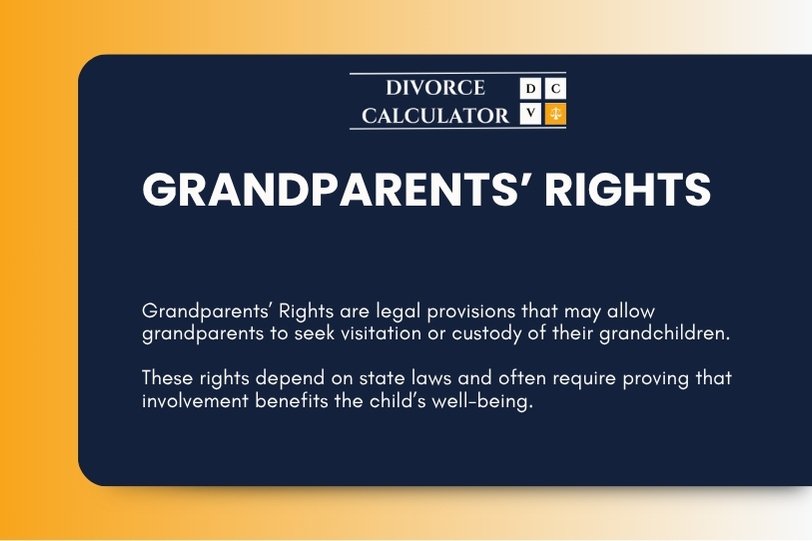The relationship between grandparents and grandchildren can be one of the most meaningful bonds in a family. However, family changes such as divorce or separation can sometimes challenge those connections and raise questions about legal rights and visitation. Grandparents’ rights refer to the legal ability of grandparents to seek visitation or custody of their grandchildren under certain circumstances.
Understanding these rights can help us navigate difficult family situations and ensure the best interests of our loved ones are protected. Laws vary from state to state, making it important for us to know what protections and options exist. We’ll explore how courts consider grandparents’ involvement and what steps we can take if we’re concerned about maintaining those vital family relationships.
Key Takeaways
Grandparents’ rights vary significantly by state. Legal recognition is not automatic and often depends on specific situations, such as parental divorce or the death of a parent.
We may need to seek court involvement if we are denied access to our grandchildren. Courts focus on the child’s best interests, not simply our wishes as grandparents.
Key factors courts consider:
- The existing relationship between us and our grandchildren
- Parental reasons for limiting contact
- The child’s emotional and physical needs
It is important to know that our rights as grandparents do not override the parents’ fundamental rights. We typically have standing to request visitation only under certain conditions, such as parental absence or separation.
Whenever possible, we should try to resolve disagreements outside of court. Mediation and open communication can help maintain family relationships.
| Situation | Grandparents’ Rights? |
|---|---|
| Parents married | Rarely granted |
| Parents divorced | Sometimes granted |
| Parent deceased | More likely granted |
Legal advice can clarify our options and the procedures in our state. We should document our relationship with our grandchildren and any attempts to communicate or visit.

Why It Matters In Divorce
When parents divorce, the family dynamic changes, often reducing the time children spend with extended family. Grandparents play a key role in offering emotional and practical support during these transitions.
We often see that children can benefit from ongoing relationships with their grandparents. These relationships add stability and a sense of continuity, which is especially important during a divorce.
Key reasons why grandparents’ rights are important in divorce:
- Children may lose contact with one side of the family without legal rights in place.
- Grandparents can provide additional care, helping single parents manage.
- Maintaining bonds with grandparents supports children’s mental health.
| Benefit | Explanation |
|---|---|
| Emotional Support | Grandparents offer reassurance and comfort. |
| Stability | They help maintain family routines. |
| Family Bonding | Children feel connected to their heritage. |
Courts sometimes consider grandparents’ visitation or custody rights when it serves the child’s best interests. Our involvement as extended family members may be critical, especially if a parent is unable or unavailable to care for the child.
Legal recognition of grandparents’ rights can shape custody arrangements, create visitation schedules, and influence the child’s long-term wellbeing. We should understand these rights when navigating the effects of divorce on our families.
Real-Life Examples
In Smith v. Jones (2019), we saw a grandmother petition the court for visitation after her son’s divorce limited her access to her grandchildren. The court granted her scheduled visits, emphasizing the child’s best interest and existing emotional bond.
Table: Examples of Grandparents’ Rights Cases
| Case | Issue | Outcome |
|---|---|---|
| Smith v. Jones (2019) | Grandmother visitation post-divorce | Visits granted |
| Lee v. Carter (2021) | Custody after parental death | Joint custody awarded |
| Patel v. Singh (2020) | Denied access by parent | Mediation recommended |
We often encounter cases where grandparents step in after a family tragedy. In Lee v. Carter (2021), two grandparents jointly received custody when both parents passed away suddenly.
In situations like Patel v. Singh (2020), a parent restricted grandparent access without court involvement. The court suggested mediation before taking further legal action, aiming to preserve family relationships.
These examples highlight different outcomes. Sometimes, courts grant visitation or custody, while other times they encourage reconciliation through mediation.
How States Handle It
Grandparents’ rights are based on state laws, making policies and procedures different depending on where we live. Some states limit these rights strictly, while others grant broad visitation or even custody in special circumstances.
How Different States Handle Grandparents’ Rights
States often balance parental autonomy with the interests of grandparents and grandchildren. The U.S. Supreme Court case Troxel v. Granville (2000) guides how states approach these laws, emphasizing parental judgment but leaving room for state-specific exceptions.
We see most states allow grandparents to request visitation after key family events such as divorce, parental death, or when a parent is deemed unfit. Courts look at factors like the child’s best interest, the existing grandparent-grandchild relationship, and any potential harm if visits are denied.
Some states, including Utah and Washington, have among the strictest standards, requiring significant evidence before awarding visitation. Others, like Pennsylvania and Ohio, are more flexible and allow broader petitions by grandparents.
NY
In New York, grandparents have a statutory right to petition for visitation under certain conditions. The main situations are when one or both parents are deceased or if special circumstances exist that warrant court intervention.
Courts place significant weight on the pre-existing relationship between grandparents and grandchildren. Judges must consider whether granting visitation aligns with the best interests of the child and whether it would interfere with the parent-child relationship.
New York does not allow grandparents to seek visitation if an intact family opposes it, except in rare situations. Custody by grandparents is only considered if the parents are found unfit or if “extraordinary circumstances” are proven in court.
CA
California law lets grandparents seek reasonable visitation if it serves the child’s best interest. Grandparents can petition if the parents are separated, the child does not live with either parent, or one parent joins the petition. If parents are married and together, courts generally will not hear such requests unless exceptions apply, such as when a parent’s whereabouts are unknown.
Courts examine the bond between the grandparent and grandchild, any prior contact, and what impact visitation may have on the child’s well-being. If a visitation petition is filed, both parents and all legal guardians must be notified.
Grandparents in California have a higher chance of success when they can show an established relationship with the grandchild. However, parental rights are highly protected, and courts avoid overruling fit parents’ preferences unless compelling reasons exist.
TX
Texas has more restrictive standards for grandparents seeking visitation or custody. Under Texas law, grandparents can only request visitation if at least one biological parent still retains parental rights and the child’s physical or emotional welfare is at risk without continued contact.
The law requires proof that denying grandparent access would significantly impair the child’s health or development. Even then, the court will defer to a parent’s wishes unless clear evidence justifies a different outcome.
If the child is adopted by someone other than a stepparent, all grandparent visitation rights are automatically terminated in Texas. This gives Texas some of the strictest limits on these rights compared to other large states.
FL
Florida’s laws on grandparents’ rights are specific about who can file for visitation and under what circumstances. Grandparents may petition only if both parents are deceased, missing, or in a persistent vegetative state, or if one parent is deceased or missing and the other has been convicted of a felony or otherwise poses significant harm to the child.
Florida courts closely follow strict guidelines when considering a grandparent’s petition. The key factor is always the child’s best interest, but the court cannot override a fit parent’s wishes unless strong evidence shows harm to the child.
Custody by grandparents is generally limited to cases where the parents have been deemed unfit, have abandoned the child, or are unable to care for the child due to specific legal issues. Florida law, therefore, makes it challenging for grandparents to secure visitation unless extraordinary conditions are met.
Tips If You’re Dealing With Grandparents’ Rights
When navigating grandparents’ rights cases, we should keep a few key strategies in mind.
1. Gather Documentation:
We need to collect records such as visitation schedules, communication logs, and relevant messages. These can help us present our case more clearly.
2. Know the Law:
Understanding state-specific laws about grandparents’ rights is critical. We should consult with a legal professional who specializes in family law.
3. Prioritize the Child’s Best Interests:
Courts focus on the child’s wellbeing. We must consider what arrangement truly benefits the child and be prepared to discuss this in any proceedings.
Checklist for Preparation:
- Collect legal documents
- List important dates and events
- Prepare a summary of our relationship with the child
- Identify witnesses if needed
4. Communicate Respectfully:
Maintaining civil communication with the other parties may help in finding common ground. It also reflects well if the matter proceeds to court.
If we feel overwhelmed, we can consider mediation. A neutral third party can sometimes help us reach an agreement without the stress of litigation.
By taking these steps, we can approach the situation in an organized and informed manner.
Frequently Asked Questions
We often encounter questions about how grandparents can establish or protect their rights when it comes to visitation and custody. Our focus here is on the precise legal avenues available, the differences among state laws, and how new legal developments can affect standing arrangements.
What legal actions can grandparents take to secure visitation rights?
We can file a petition in family court to request visitation with our grandchildren. Courts require us to show that visitation serves the child’s best interests and that denial of contact would be harmful.
How do state laws vary regarding grandparents’ rights for visitation?
We see significant variation from state to state regarding when and how courts grant grandparents visitation. Some states allow broader rights if certain conditions are met, while others have stricter rules, especially if the child’s parents are married and the family is intact.
Under what conditions may a grandparent petition for custody of a grandchild?
We may seek custody if we can demonstrate that the child’s parents are unfit or that living with us is in the child’s best interest. This often involves situations involving abuse, neglect, parental incapacity, or the child’s abandonment.
How does a new law impact existing statutes on grandparents’ rights?
Some states revise their family law statutes to clarify or limit the situations in which we have standing to seek visitation or custody. Changes can include stricter requirements or new criteria that courts must consider, affecting our ability to obtain court-ordered access to our grandchildren.
What role does the best interest of the child play in grandparents’ visitation cases?
Courts consistently prioritize the child’s best interest in visitation disputes. We must provide evidence that our involvement benefits the child’s emotional and physical well-being or that denying contact would cause harm.
Are there any recent court precedents affecting grandparents’ custody or visitation rights?
We have observed recent appellate court decisions that reaffirm the constitutional rights of fit parents, making it harder for us to override parental decisions. However, some cases support grandparent rights when exceptional circumstances justify court intervention.



